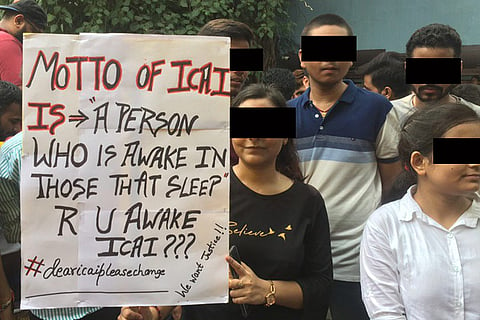

Hundreds of students pursuing the coveted Chartered Accountancy course are up in arms against The Institute of Chartered Accountants of India (ICAI). Their demand is plain and simple – Amending CA Regulations to provide them with an option to get their answer papers re-evaluated.
The current protests by the students in front of ICAI’s regional and city chapters across India has perhaps brought to the fore, the need for reforms in the course structure. ICAI has been on the defensive on the current protests, issuing statements reiterating that the CA Regulations do not allow revaluation of papers and that the examination system of ICAI is robust. The fact remains that the course is rigid and allows little or no flexibility when it comes to churning out accounting professionals, unlike in other countries.
ICAI has been lacking the desperate push to make the course attractive to entrants for years now.
The most important reason why students opt for the CA qualification has been money and status in the society.
In fact, on the reforms front, it was after a long period that the ICAI introduced electives in its CA course at the final level. Till a few years ago, students had no choice but to study all eight subjects prescribed by ICAI at the final level. Apart from this an overhaul of the core course structure is long overdue, even if it is to attract more talent and improve the quality of professionals entering job market.
Easier entry
CA qualifying exams are among the toughest exams in the country, with low pass percentages. The pass percentage from the Foundation course (Also known as Common Proficiency Test) to the final level typically reduces drastically. This means that only very few students entering the system gain the qualifications to become Chartered Accountants. This leaves students unable to clear final exams, with no way out of the system.
It would make sense to tighten the entry norms by increasing the minimum marks required to pass. That will ensure that only students who have high marks enter the system and those who don’t earn the required marks are shown the door, right away. This would give the students an open door to consider other career options at the college level instead of looking for newer options when they are 25 years and after giving multiple attempts at CA final. At 25 years, the scope for a student to look for colleges or new degrees in regular colleges are quite minimal.
Blind to ground realities
Another important aspect that needs attention is the requirement to give exams group-wise only and not individual paper-wise. Now, what are the practical difficulties in having this system?
A group in CA final has four papers. Each of these subjects have a vast syllabus and requires undivided attention from the student for preparation. While this might not seem a big problem for students who are in the last six months of their mandatory articleship period, it is difficult for students who are trying hard to clear the exams after three attempts.
Such students generally opt to work under a Chartered Accountant or any other company for bare minimum wages and usually lack sufficient time for preparation. Most students also cannot afford not to be employed while they prepare for exams, since that needs significant financial backing from parents and others. In short, the system at present, supports only those who are economically privileged.
Also, students who qualify for the exams and become CAs usually work in a maximum of two or three domains through their career. With that as the status quo, what use is a system which forces students to be an expert in eight different domains at the final, qualifying lap of the race? Why can’t students write one paper after the other, with sufficient expertise in each of them, similar to professional accounting exams conducted by other countries? Or why can’t students choose to pick just two or three papers and gather expert knowledge in it, thereby becoming a specialist in those domain areas?
ICAI’s insistence of churning out world-class professionals might be true to an extent, but at what cost? By forcing students to keep their careers on hold, the ICAI is inflicting heavy and sometimes irreparable damage to the morale and self-esteem of the students. The ICAI is headed on a downward slope. It would be better to wake up and act.
Views expressed are the author's own.